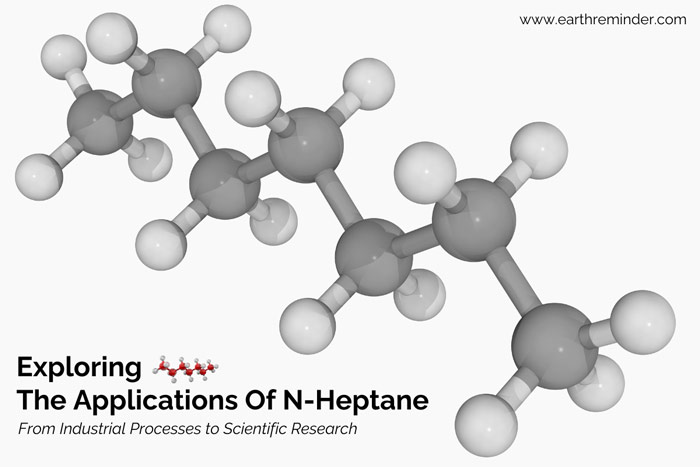Exploring The Applications Of N-Heptane: From Industrial Processes to Scientific Research
Exploring The Applications Of N-Heptane: From Industrial Processes to Scientific Research
N-heptane is an alkane hydrocarbon derived from crude oil and is widely used in various industrial processes and scientific research due to its unique chemical properties. It is an odorless and colorless liquid with a high boiling point and low melting point. N-heptane is a non-polar molecule, which makes it ideal for use as a solvent for non-polar compounds. This alkane hydrocarbon is a crucial component for various industrial processes and scientific research. In this article, we explore the industrial and scientific applications of N-heptane and how it affects the environment.
Table of Contents
Industrial Processes
Have you ever wondered what is N-heptane used for?
N-heptane is used in various industries as a component in gasoline. It is employed as a reference standard to determine the octane ratings of gasoline, which measures the fuel’s efficiency in engines. The higher the octane rating, the more efficient the engine is. N-heptane has an octane rating of zero, which makes it a reference point for rating other gasoline components.
Beyond the automotive sector, N-heptane also contributes to rubber and plastics manufacturing processes. Its presence aids in extracting oils and resins, facilitating the production of high-quality rubber and plastic materials. Furthermore, N-heptane serves as a solvent in formulating industrial coatings, adhesives, and sealants, enhancing their effectiveness and durability. With its widespread applications and remarkable properties, N-heptane plays a pivotal role in various industries, contributing to the advancement and efficiency of numerous manufacturing processes.
Scientific Research
N-heptane has proven to be a crucial tool in various scientific research fields. In chemistry, N-heptane plays a crucial role in mixtures, enabling the study of intricate molecular interactions that shed light on the complex protein folding process. Moreover, its application extends to investigating the thermodynamic properties of diverse polymer networks and liquid crystal formulations, unraveling the intricate behaviors of these materials. In biology, N-heptane finds utility in shrinking cells, rendering them more accessible for meticulous examination under a microscope. Its versatility even extends to neuroscience research, where it is employed to uncouple neuronal activity within the intricate workings of the brain, aiding in the quest for a deeper understanding of its complex mechanisms.
Fuel Additive
As a fuel additive, N-heptane plays a crucial role in enhancing the properties of diesel fuel. It is a blending component that helps improve the fuel’s volatility, making it easier to ignite. Additionally, N-heptane significantly contributes to the cetane rating of diesel fuel, which measures the ignition delay time. A higher cetane number indicates a more efficient combustion process, leading to reduced emissions and improved engine performance. Incorporating N-heptane into diesel fuel ensures optimal fuel quality and maximizes the overall efficiency of combustion engines.
Environmental Impact
As a fossil fuel, N-heptane is potentially hazardous to the environment. When it is burned, it releases carbon dioxide, nitrogen oxides, and other greenhouse gases. These emissions contribute to global warming and air pollution, which can have severe environmental consequences. However, recent research has shown that gasoline blended with N-heptane can reduce emissions, as it increases the fuel’s octane rating. This reduces the need for other, more harmful additives, such as lead and benzene.
Medical Applications
N-heptane, a hydrocarbon compound, finds application in the medical field to efficiently remove topical anesthetic creams from the skin. Moreover, it is a valuable diluent in various medicinal products, including dental implants and bone cement, aiding in their formulation and stability. Additionally, this versatile compound plays a significant role in micro-encapsulation processes, contributing to the development of advanced drug delivery systems for targeted and controlled release of medications.
Also Read: Ways to Conserve Fossil Fuels.
Conclusion
So, have you learned what is n-heptane used for? N-heptane has numerous applications in different industries and scientific fields. Its use as a reference standard in gasoline and a fuel additive has proven crucial in reducing emissions, improving engine performance, and ensuring fuel efficiency. Furthermore, its applications in scientific research have provided insights into the molecular interactions of different biological and chemical compounds. However, its potential environmental impact cannot be ignored. While it can offer a less harmful alternative to lead and benzene additives, the fossil fuel industry’s impact is undeniable. Exploring cleaner alternative fuel sources is crucial to mitigate environmental damage caused by fossil fuel consumption.
